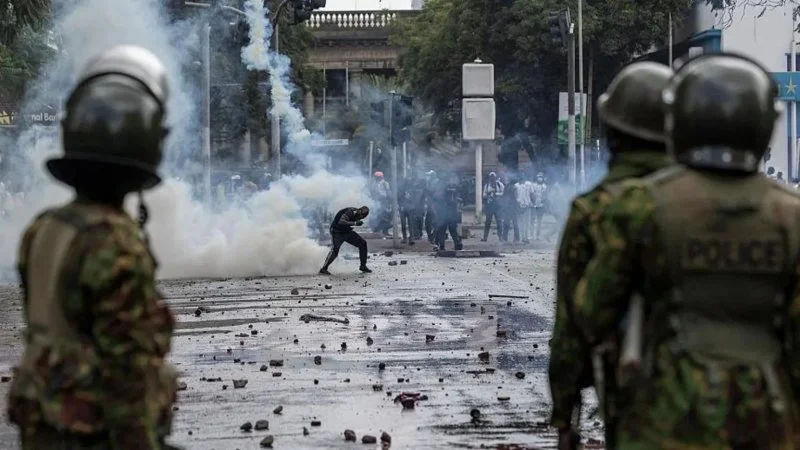Kenya’s Interior Minister Kipchumba Murkomen on Thursday, June 26, 2025 accused protesters of attempting to overthrow the government during violent demonstrations that left at least 16 people dead, according to Amnesty Kenya.
The protests, which rocked Nairobi and other cities on Wednesday, were marked by looting, arson, and clashes with police, reigniting tensions one year after deadly anti-tax demonstrations stormed Kenya’s parliament.
Deadly Clashes and Government Response
The protests, initially called to commemorate the 2024 anti-tax demonstrations that killed over 60 people, were fueled by public outrage over the recent death of blogger Albert Ojwang, 31, in police custody.
Amnesty Kenya reported 16 deaths by Wednesday evening, all from suspected police gunfire, with over 400 injuries, including three police officers and 83 requiring specialized care.
Murkomen, speaking at a press conference, claimed at least 10 people were killed and described the protests as “terrorism” and an “unconstitutional attempt to change the regime.”
He alleged that “criminal anarchists” unleashed violence, looting, and sexual assault, forcing police to block crowds approaching parliament and State House.
Destruction and Calls for Dialogue
In central Nairobi, smoke billowed from at least 10 torched buildings on Thursday as shopkeepers cleaned up the charred aftermath of overnight looting and arson.
Josephine Apondi, a shopkeeper, reported losing two million shillings ($15,500) worth of phones and electronics to looters.
Ibrahim Hamisi, whose building was burned, urged the government and the youth-led protesters, known as Gen Z, to engage in dialogue to resolve the escalating conflict.
“Everything they burnt. So please, government, try talking to the Gen Z,” Hamisi said.
Protest Leaders Reject Coup Claims
Prominent protest leader Boniface Mwangi dismissed Murkomen’s coup accusations as a tactic to deflect attention from protesters’ demands for accountability and reform.
The demonstrations, amplified by anger over Ojwang’s death, have spotlighted ongoing concerns about police brutality.
Kenyan prosecutors recently approved murder charges against six individuals, including three police officers, in connection with Ojwang’s death, though all have pleaded not guilty.
Context of Ongoing Unrest
Wednesday’s protests mark a continuation of public discontent that began with last year’s anti-tax demonstrations, which culminated in the storming of parliament on June 25, 2024.
The Kenya National Commission on Human Rights (KNCHR) previously reported eight deaths and over 400 casualties, alleging excessive police force, including the use of rubber bullets and live ammunition.
The Independent Policing Oversight Authority (IPOA) noted 61 arrests during the latest protests, while Kenyatta National Hospital admitted 107 patients, mostly with gunshot injuries.
As Kenya grapples with rising tensions, calls for dialogue and accountability grow louder, with human rights groups urging an end to police violence and meaningful engagement with protesters’ grievances.























